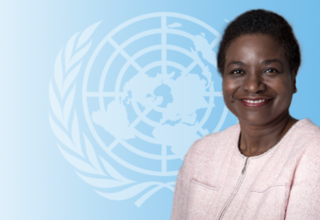You are here
About us
UNFPA is the United Nations Reproductive Health and Rights Agency, ensuring reproductive rights for all. UNFPA has been supporting, since 1979, the Government of Guinea-Bissau to implement development and humanitarian interventions that ensure universal access to sexual and reproductive health, promote reproductive rights, reduce maternal mortality, promote gender equality and accelerate progress towards the achievement of the ICPD declaration. The current UNFPA Guinea-Bissau Country Programme – CP6 (2016-2020) is aligned with the national priorities described in the “Terra Ranka “strategic and operational plan 2015-2020, supports the attainment of the Sustainable Development Goals, the ICPD Programme of Action and is in line with new UNFPA strategic plan and results framework (2018-2021). UNFPA Guinea-Bissau contributes to the United Nations Partnership Assistance Framework (UNPAF) 2016-2020, signed between Government of Guinea-Bissau and the United Nations System in April 2016. UNFPA has only one office in Bissau, the capital city.
Since its independence in 1974, Guinea-Bissau has experienced chronic instability, armed conflict and socio-economic challenges until 2012, which weakened its institutional capacity nationwide. Following presidential and legislative elections in 2014, the country was experiencing positive recovery, leading to the development of the strategic and operational plan, 2015-2020, or Terra Ranka, presented at a donors round table held in Brussels on 25 March 2015. Unfortunately due to new recurrent political instability, the country had 5 consecutive Governments since August 2015, and is waiting for its Sixth Government since 16 January 2018.
The country’s estimated population in 2014 was 1.5 million (52 per cent women, 32 per cent aged 1024 years). In 2011, the growth rate was 2.4 per cent and the total fertility rate was five children per woman. Maternal mortality remains high (900 deaths per 100,000 live births in 2014, according to MICS 2014). Births attended by skilled health personnel remain low (45 per cent in 2014). The slow improvement of maternal, sexual and reproductive health is attributed to inadequate infrastructure, supplies and equipment; limited skilled human resources; lack of available reproductive health commodities; and limited access to comprehensive emergency obstetric and neonatal care services. This also explains the many obstetric fistula cases and lack of routine screening of cervical cancer, which is prevalent in women. The modern contraceptive prevalence rate remains low (14 per cent in 2014), with an unmet need of 22 per cent. Sociocultural barriers contribute to the low demand for modern contraceptive methods. The HIV prevalence rate was 3.7 per cent for adults aged 15-49 years in 2013 (1.3 per cent among young people aged 15-24 years), with young women nearly twice as likely to be HIV positive as young men. The highest prevalence rates were for sex workers and pregnant women, at 8.9 per cent and 5.0 per cent, respectively. Adolescent fertility is high (137 per 1,000 women), aggravated by limited access to youth-friendly reproductive health services.
Our mission in Guinea-Bissau, is to - End unmet need for family planning, - End maternal death, and - End violence and harmful practices against women and girls. To achieve these objectives in Guinea-Bissau, UNFPA focuses on the provision of quality reproductive health (RH) care, including Family Planning; Assisted deliveries; Emergency obstetric and newborn care services; prevention and treatment of obstetric fistula; Adolescent and Youth Sexual Reproductive Health; building human resource capacity for health; Prevention and Response to SGBV; Prevention and Treatment of sexually transmitted infections, including HIV-AIDS; provision of essential RH commodities including contraceptives, lifesaving products and condoms; and strengthening the Health System including increasing access through the construction/rehabilitation of 6 health facilities, some of which were closed for 19 years. UNFPA also assists the government of Guinea-Bissau to organize its population and housing censuses to generate accurate data for policies and programme formulation, and emphasizes the engagement with youth and women to promote reproductive rights and sustainable development. UNFPA advocates and provides technical support for the implementation of the national statistics strategy and execution of relevant studies for the development of appropriate policies for harnessing the Demographic Dividend in the country. UNFPA contributed to the conduct and dissemination of results from the 2009 Guinea-Bissau Census and has started the preparation for the 2019 Census.
In the area of FGM, a harmful practice that affects 44,9% of women of Guinea-Bissau, UNFPA uses an innovative multidisciplinary approach involving different implementing partners (Government institutions, CSOs, NGOs and faith based organizations) to combating the practice in the country.

